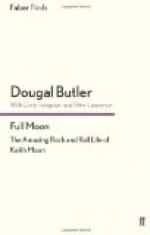Her appearance in that secluded spot was unexpected, but at the moment Austin Turold did not give it more than a passing thought. He hurried across Market Jew Street and engaged a cabman to drive him home.
The ancient vehicle jolted over the moor road in crawling ascent, and in due time reached the spot where the straggling churchtown squatted among boulders in the desolation of the moors, wanting but cave men to start up from behind the great stones to complete the likeness to a village of the stone age. The cab drifted along between the granite houses of a wide street, like a ship which had lost its bearings, but cast anchor before one where a few stunted garden growths bloomed in an ineffectual effort to lessen the general aspect of appalling stoniness. Austin Turold paid the cabman and walked into this house. He opened the door with his latchkey, and ascended rapidly to the first floor.
Lunch was set for two in the room which he entered, and Charles Turold was seated at the table, turning over the pages of a book. He glanced up expectantly, and his lips formed one word—
“Well?”
“It is not well,” was the testy response. “My charming sister has called in the assistance of Scotland Yard. You’ll have to stay. We’ve got to face this thing out.”
His son received this piece of news with a pale face. “You should have foreseen this last night,” he said.
“I saw Sisily in Penzance—near the gardens.”
“Where was she going?” asked Charles, flushing slightly.
“I really cannot say. You should be better acquainted with her movements than I,” was the ironical response. “You do not suppose I have been altogether blind to your infatuation, do you? If you choose to go walking and flirting with a girl on Cornish moors you must expect to be observed. As a matter of fact I thought it rather a good move on your part, until I learnt the secret of Sisily’s birth.”
“I tell you I won’t stand this,” exclaimed Charles, springing up from the table.
“Won’t?” said his father. “You carry things with a high hand—Jonathan.” His look dwelt coldly on his son. “Do not be a fool. Sit down and let us have lunch, and we’ll discuss afterwards what’s best to be done.”
CHAPTER XII
With a slightly incredulous air Inspector Dawfield placed his London colleague in possession of his own knowledge of the facts of the case, based on the statements made to him by Mrs. Pendleton that morning and the facts as set forth in Sergeant Pengowan’s report.
Detective Barrant listened attentively, with the air of a man smiling to himself. He was not actually doing so, but that was the impression conveyed by his keen bright eyes. He was a Londoner, with an assured manner, and the conviction that his intelligence was equal to any call which might be made upon it. By temperament he was restless, but his work had given him a philosophical outlook which in some measure counterpoised that defect by causing him to realize that life was a tricky and deceptive business in which intelligence counted for more than action in the long run. He had a wider outlook and more shrewdness than the average detective, and he already felt a keen interest in the case he had been called in to investigate.




